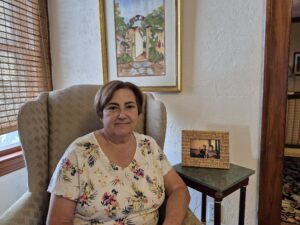Nov 5
You’re Like a Raw Nerve: A Caregiving Story

Marilyn is a true jack-of-all-trades: a scuba diver, a former professional singer, and a skilled craftswoman. For 25 years, she helped her lifelong friend Jeanne turn craftiness into a thriving home renovation business. The business worked so well because of the depth of their friendship and their teamwork. Eventually they also became housemates, when Marilyn moved in to Jeanne’s family home. But when Jeanne began showing signs of Alzheimer’s, some aspects of their daily life started to change.
“The first time I really noticed a problem was during a job bid several years ago,” Marilyn recalls. “Jeanne went back three times because she couldn’t keep track of important details for the quote.” Eventually, Jeanne had to close the business, and with it went Marilyn’s livelihood. In its place came a new role: caring for Jeanne.
As Jeanne has became more dependent, she has also become reluctant to discuss her changing condition. Her big personality now sometimes comes out in angry outbursts, which Jeanne forgets minutes later. “I just remind myself that it’s not her fault,” Marilyn says. “But sometimes with all the juggling – it feels like you’re just a raw nerve. And on top of everything else, I have the financial challenge of no longer having a job.”
Getting Jeanne a diagnosis helped because doctors were able to point Marilyn to resources, although even that sometimes felt like “drinking from a firehose,” both because the system is fragmented and because it’s hard to follow up on help when you are overwhelmed. One recommendation that got Marilyn’s attention was Springwell’s Consumer Directed Care option for In-Home care. In this program, some caregivers can be compensated under the MA Home Care Program. After an initial assessment, Jeanne was approved and Marilyn began receiving compensation for two hours of paid care per week. Jeanne was also put on the waitlist for the Enhanced Community Options Program (ECOP), which would allow for a higher level of care. When a slot opened, she was able to move off the waitlist relatively quickly, and Marilyn is now able to receive nine and a half hours of pay each week for the caregiving support she provides.
Marilyn is still struggling in her role as a caregiver. But now, with Springwell addressing her most pressing need, she has both a path and a partner going forward. Marilyn hopes that Springwell can provide more guidance on things that might help. She looks forward to learning more about the caregiving resources Springwell can provide to help ease her way so that she can continue to be there for her friend.

